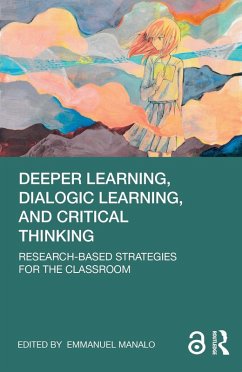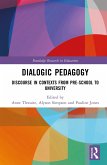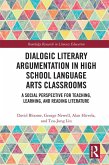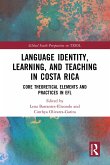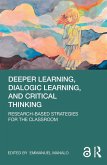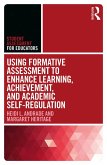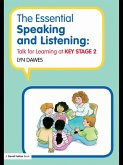Deeper Learning, Dialogic Learning, and Critical Thinking (eBook, PDF)
Research-based Strategies for the Classroom
Redaktion: Manalo, Emmanuel
0,00 €
0,00 €
inkl. MwSt.
Sofort per Download lieferbar

0 °P sammeln
0,00 €
Als Download kaufen

0,00 €
inkl. MwSt.
Sofort per Download lieferbar

0 °P sammeln
Jetzt verschenken
Alle Infos zum eBook verschenken
0,00 €
inkl. MwSt.
Sofort per Download lieferbar
Alle Infos zum eBook verschenken

0 °P sammeln
Deeper Learning, Dialogic Learning, and Critical Thinking (eBook, PDF)
Research-based Strategies for the Classroom
Redaktion: Manalo, Emmanuel
- Format: PDF
- Merkliste
- Auf die Merkliste
- Bewerten Bewerten
- Teilen
- Produkt teilen
- Produkterinnerung
- Produkterinnerung

Bitte loggen Sie sich zunächst in Ihr Kundenkonto ein oder registrieren Sie sich bei
bücher.de, um das eBook-Abo tolino select nutzen zu können.
Hier können Sie sich einloggen
Hier können Sie sich einloggen
Sie sind bereits eingeloggt. Klicken Sie auf 2. tolino select Abo, um fortzufahren.

Bitte loggen Sie sich zunächst in Ihr Kundenkonto ein oder registrieren Sie sich bei bücher.de, um das eBook-Abo tolino select nutzen zu können.
This book creates tangible links between innovative educational research and classroom teaching practices to address the all-important question of how we can realize our ideals for education in the 21st Century.
- Geräte: PC
- ohne Kopierschutz
- eBook Hilfe
- Größe: 11.19MB
Andere Kunden interessierten sich auch für
![Dialogic Pedagogy (eBook, PDF) Dialogic Pedagogy (eBook, PDF)]() Dialogic Pedagogy (eBook, PDF)40,95 €
Dialogic Pedagogy (eBook, PDF)40,95 €![Affect, Learning, and Teacher Education (eBook, PDF) Affect, Learning, and Teacher Education (eBook, PDF)]() Erica E. ColmenaresAffect, Learning, and Teacher Education (eBook, PDF)41,95 €
Erica E. ColmenaresAffect, Learning, and Teacher Education (eBook, PDF)41,95 €![Dialogic Literary Argumentation in High School Language Arts Classrooms (eBook, PDF) Dialogic Literary Argumentation in High School Language Arts Classrooms (eBook, PDF)]() David BloomeDialogic Literary Argumentation in High School Language Arts Classrooms (eBook, PDF)40,95 €
David BloomeDialogic Literary Argumentation in High School Language Arts Classrooms (eBook, PDF)40,95 €![Language Identity, Learning, and Teaching in Costa Rica (eBook, PDF) Language Identity, Learning, and Teaching in Costa Rica (eBook, PDF)]() Language Identity, Learning, and Teaching in Costa Rica (eBook, PDF)40,95 €
Language Identity, Learning, and Teaching in Costa Rica (eBook, PDF)40,95 €![Deeper Learning, Dialogic Learning, and Critical Thinking (eBook, ePUB) Deeper Learning, Dialogic Learning, and Critical Thinking (eBook, ePUB)]() Deeper Learning, Dialogic Learning, and Critical Thinking (eBook, ePUB)0,00 €
Deeper Learning, Dialogic Learning, and Critical Thinking (eBook, ePUB)0,00 €![Using Formative Assessment to Enhance Learning, Achievement, and Academic Self-Regulation (eBook, PDF) Using Formative Assessment to Enhance Learning, Achievement, and Academic Self-Regulation (eBook, PDF)]() Heidi L. AndradeUsing Formative Assessment to Enhance Learning, Achievement, and Academic Self-Regulation (eBook, PDF)30,95 €
Heidi L. AndradeUsing Formative Assessment to Enhance Learning, Achievement, and Academic Self-Regulation (eBook, PDF)30,95 €![The Essential Speaking and Listening (eBook, PDF) The Essential Speaking and Listening (eBook, PDF)]() Lyn DawesThe Essential Speaking and Listening (eBook, PDF)30,95 €
Lyn DawesThe Essential Speaking and Listening (eBook, PDF)30,95 €-
-
-
This book creates tangible links between innovative educational research and classroom teaching practices to address the all-important question of how we can realize our ideals for education in the 21st Century.
Dieser Download kann aus rechtlichen Gründen nur mit Rechnungsadresse in A, B, BG, CY, CZ, D, DK, EW, E, FIN, F, GR, HR, H, IRL, I, LT, L, LR, M, NL, PL, P, R, S, SLO, SK ausgeliefert werden.
Produktdetails
- Produktdetails
- Verlag: Taylor & Francis eBooks
- Seitenzahl: 386
- Erscheinungstermin: 12. September 2019
- Englisch
- ISBN-13: 9781000617443
- Artikelnr.: 58399280
- Verlag: Taylor & Francis eBooks
- Seitenzahl: 386
- Erscheinungstermin: 12. September 2019
- Englisch
- ISBN-13: 9781000617443
- Artikelnr.: 58399280
- Herstellerkennzeichnung Die Herstellerinformationen sind derzeit nicht verfügbar.
Acknowledgement
List of contributors
Introduction: Establishing a Case for Sharing Research-Based Instructional
Strategies (Emmanuel Manalo)
Part 1: Structuring Dialogue
1. The Playground of Ideas: Developing a Structured Approach to the
Community of Inquiry for Young Children (Laura Kerslake)
2. The Thinking Together approach to Dialogic Teaching (Neil Phillipson &
Rupert Wegerif)
3. Compare and Discuss to Promote Deeper Learning (Bethany Rittle-Johnson,
Jon R. Star, Kelley Durkin, & Abbey Loehr)
Part 2: Facilitating Meaning Construction
4. Refining Student Thinking through Scientific Theory Building (Hillary
Swanson)
5. Extending Students Communicative Repertoires: A Culture of Inquiry
Perspective for Reflexive Learning (Beth V. Yeager, Maria Lucia
Castanheira, & Judith Green)
6. Transforming Classroom Discourse as a Resource for Learning: Adapting
Interactional Ethnography for Teaching and Learning (W. Douglas Baker)
Part 3: Cultivating questioning 7. Question Based Instruction (QBI)
Promotes Learners' Abilities to Ask More Questions and Express Opinions
During Group Discussions (Yoshinori Oyama and Tomoko Yagihashi)
8. AugmentedWorld: A Location-based Question Generating Platform as a Means
of Promoting 21st Century Skills (Shadi Asakle & Miri Barak)
9. Effective Way to Prepare for Deeper Learning of History (Keita
Shinogaya)
Part 4: Promoting engagement and reflection
10. "Laughter is the Best Medicine": Pedagogies of Humor and Joy that
Support Critical Thinking and Communicative Competence (Jean J. Ryoo)
11. Improving College Students' Critical Thinking Through the Use of a
Story Tool for Self-regulated Learning Training (Pedro Rosário, José Carlos
Núñez, Paula Magalhães, Sonia Fuentes, Cleidilene Magalhães, & Kyle Busing)
12. Debugging as a Context for Fostering Reflection on Critical Thinking
and Emotion (David DeLiema, Maggie Dahn, Virginia J. Flood, Ana Asuncion,
Dor Abrahamson, Noel Enyedy, & Francis Steen)
Part 5: Training Specific Competencies
13. Showing What It Looks Like: Teaching Students to Use Diagrams in
Problem Solving, Communication, and Thinking (Emmanuel Manalo, Yuri Uesaka,
Ouhao Chen, & Hiroaki Ayabe)
14. Class Design for Developing Presentation Skills for Graduate Research
Students (Etsuko Tanaka & Emmanuel Manalo)
15. Online Written Argumentation: Internal Dialogic Features and Classroom
Instruction (Naomi Rosedale, Stuart McNaughton, Rebecca Jesson, Tong Zhu, &
Jacinta Oldehaver)
16. Cultivating Pre-Service and In-Service Teachers' Abilities to Deepen
Understanding and Promote Learning Strategy Use in Pupils (Tatsushi Fukaya
& Yuri Uesaka)
Part 6: Program/Course Teaching
17. Cultivation of a Critical Thinking Disposition and Inquiry Skills Among
High School Students (Takashi Kusumi)
18. Using Task-based Language Teaching in the Second Language Classroom:
Developing Global Communication Competencies (Chris Sheppard)
19. Collective Reasoning in Elementary Engineering Education (Christine M.
Cunningham & Gregory J. Kelly)
Index
List of contributors
Introduction: Establishing a Case for Sharing Research-Based Instructional
Strategies (Emmanuel Manalo)
Part 1: Structuring Dialogue
1. The Playground of Ideas: Developing a Structured Approach to the
Community of Inquiry for Young Children (Laura Kerslake)
2. The Thinking Together approach to Dialogic Teaching (Neil Phillipson &
Rupert Wegerif)
3. Compare and Discuss to Promote Deeper Learning (Bethany Rittle-Johnson,
Jon R. Star, Kelley Durkin, & Abbey Loehr)
Part 2: Facilitating Meaning Construction
4. Refining Student Thinking through Scientific Theory Building (Hillary
Swanson)
5. Extending Students Communicative Repertoires: A Culture of Inquiry
Perspective for Reflexive Learning (Beth V. Yeager, Maria Lucia
Castanheira, & Judith Green)
6. Transforming Classroom Discourse as a Resource for Learning: Adapting
Interactional Ethnography for Teaching and Learning (W. Douglas Baker)
Part 3: Cultivating questioning 7. Question Based Instruction (QBI)
Promotes Learners' Abilities to Ask More Questions and Express Opinions
During Group Discussions (Yoshinori Oyama and Tomoko Yagihashi)
8. AugmentedWorld: A Location-based Question Generating Platform as a Means
of Promoting 21st Century Skills (Shadi Asakle & Miri Barak)
9. Effective Way to Prepare for Deeper Learning of History (Keita
Shinogaya)
Part 4: Promoting engagement and reflection
10. "Laughter is the Best Medicine": Pedagogies of Humor and Joy that
Support Critical Thinking and Communicative Competence (Jean J. Ryoo)
11. Improving College Students' Critical Thinking Through the Use of a
Story Tool for Self-regulated Learning Training (Pedro Rosário, José Carlos
Núñez, Paula Magalhães, Sonia Fuentes, Cleidilene Magalhães, & Kyle Busing)
12. Debugging as a Context for Fostering Reflection on Critical Thinking
and Emotion (David DeLiema, Maggie Dahn, Virginia J. Flood, Ana Asuncion,
Dor Abrahamson, Noel Enyedy, & Francis Steen)
Part 5: Training Specific Competencies
13. Showing What It Looks Like: Teaching Students to Use Diagrams in
Problem Solving, Communication, and Thinking (Emmanuel Manalo, Yuri Uesaka,
Ouhao Chen, & Hiroaki Ayabe)
14. Class Design for Developing Presentation Skills for Graduate Research
Students (Etsuko Tanaka & Emmanuel Manalo)
15. Online Written Argumentation: Internal Dialogic Features and Classroom
Instruction (Naomi Rosedale, Stuart McNaughton, Rebecca Jesson, Tong Zhu, &
Jacinta Oldehaver)
16. Cultivating Pre-Service and In-Service Teachers' Abilities to Deepen
Understanding and Promote Learning Strategy Use in Pupils (Tatsushi Fukaya
& Yuri Uesaka)
Part 6: Program/Course Teaching
17. Cultivation of a Critical Thinking Disposition and Inquiry Skills Among
High School Students (Takashi Kusumi)
18. Using Task-based Language Teaching in the Second Language Classroom:
Developing Global Communication Competencies (Chris Sheppard)
19. Collective Reasoning in Elementary Engineering Education (Christine M.
Cunningham & Gregory J. Kelly)
Index
Acknowledgement
List of contributors
Introduction: Establishing a Case for Sharing Research-Based Instructional
Strategies (Emmanuel Manalo)
Part 1: Structuring Dialogue
1. The Playground of Ideas: Developing a Structured Approach to the
Community of Inquiry for Young Children (Laura Kerslake)
2. The Thinking Together approach to Dialogic Teaching (Neil Phillipson &
Rupert Wegerif)
3. Compare and Discuss to Promote Deeper Learning (Bethany Rittle-Johnson,
Jon R. Star, Kelley Durkin, & Abbey Loehr)
Part 2: Facilitating Meaning Construction
4. Refining Student Thinking through Scientific Theory Building (Hillary
Swanson)
5. Extending Students Communicative Repertoires: A Culture of Inquiry
Perspective for Reflexive Learning (Beth V. Yeager, Maria Lucia
Castanheira, & Judith Green)
6. Transforming Classroom Discourse as a Resource for Learning: Adapting
Interactional Ethnography for Teaching and Learning (W. Douglas Baker)
Part 3: Cultivating questioning 7. Question Based Instruction (QBI)
Promotes Learners' Abilities to Ask More Questions and Express Opinions
During Group Discussions (Yoshinori Oyama and Tomoko Yagihashi)
8. AugmentedWorld: A Location-based Question Generating Platform as a Means
of Promoting 21st Century Skills (Shadi Asakle & Miri Barak)
9. Effective Way to Prepare for Deeper Learning of History (Keita
Shinogaya)
Part 4: Promoting engagement and reflection
10. "Laughter is the Best Medicine": Pedagogies of Humor and Joy that
Support Critical Thinking and Communicative Competence (Jean J. Ryoo)
11. Improving College Students' Critical Thinking Through the Use of a
Story Tool for Self-regulated Learning Training (Pedro Rosário, José Carlos
Núñez, Paula Magalhães, Sonia Fuentes, Cleidilene Magalhães, & Kyle Busing)
12. Debugging as a Context for Fostering Reflection on Critical Thinking
and Emotion (David DeLiema, Maggie Dahn, Virginia J. Flood, Ana Asuncion,
Dor Abrahamson, Noel Enyedy, & Francis Steen)
Part 5: Training Specific Competencies
13. Showing What It Looks Like: Teaching Students to Use Diagrams in
Problem Solving, Communication, and Thinking (Emmanuel Manalo, Yuri Uesaka,
Ouhao Chen, & Hiroaki Ayabe)
14. Class Design for Developing Presentation Skills for Graduate Research
Students (Etsuko Tanaka & Emmanuel Manalo)
15. Online Written Argumentation: Internal Dialogic Features and Classroom
Instruction (Naomi Rosedale, Stuart McNaughton, Rebecca Jesson, Tong Zhu, &
Jacinta Oldehaver)
16. Cultivating Pre-Service and In-Service Teachers' Abilities to Deepen
Understanding and Promote Learning Strategy Use in Pupils (Tatsushi Fukaya
& Yuri Uesaka)
Part 6: Program/Course Teaching
17. Cultivation of a Critical Thinking Disposition and Inquiry Skills Among
High School Students (Takashi Kusumi)
18. Using Task-based Language Teaching in the Second Language Classroom:
Developing Global Communication Competencies (Chris Sheppard)
19. Collective Reasoning in Elementary Engineering Education (Christine M.
Cunningham & Gregory J. Kelly)
Index
List of contributors
Introduction: Establishing a Case for Sharing Research-Based Instructional
Strategies (Emmanuel Manalo)
Part 1: Structuring Dialogue
1. The Playground of Ideas: Developing a Structured Approach to the
Community of Inquiry for Young Children (Laura Kerslake)
2. The Thinking Together approach to Dialogic Teaching (Neil Phillipson &
Rupert Wegerif)
3. Compare and Discuss to Promote Deeper Learning (Bethany Rittle-Johnson,
Jon R. Star, Kelley Durkin, & Abbey Loehr)
Part 2: Facilitating Meaning Construction
4. Refining Student Thinking through Scientific Theory Building (Hillary
Swanson)
5. Extending Students Communicative Repertoires: A Culture of Inquiry
Perspective for Reflexive Learning (Beth V. Yeager, Maria Lucia
Castanheira, & Judith Green)
6. Transforming Classroom Discourse as a Resource for Learning: Adapting
Interactional Ethnography for Teaching and Learning (W. Douglas Baker)
Part 3: Cultivating questioning 7. Question Based Instruction (QBI)
Promotes Learners' Abilities to Ask More Questions and Express Opinions
During Group Discussions (Yoshinori Oyama and Tomoko Yagihashi)
8. AugmentedWorld: A Location-based Question Generating Platform as a Means
of Promoting 21st Century Skills (Shadi Asakle & Miri Barak)
9. Effective Way to Prepare for Deeper Learning of History (Keita
Shinogaya)
Part 4: Promoting engagement and reflection
10. "Laughter is the Best Medicine": Pedagogies of Humor and Joy that
Support Critical Thinking and Communicative Competence (Jean J. Ryoo)
11. Improving College Students' Critical Thinking Through the Use of a
Story Tool for Self-regulated Learning Training (Pedro Rosário, José Carlos
Núñez, Paula Magalhães, Sonia Fuentes, Cleidilene Magalhães, & Kyle Busing)
12. Debugging as a Context for Fostering Reflection on Critical Thinking
and Emotion (David DeLiema, Maggie Dahn, Virginia J. Flood, Ana Asuncion,
Dor Abrahamson, Noel Enyedy, & Francis Steen)
Part 5: Training Specific Competencies
13. Showing What It Looks Like: Teaching Students to Use Diagrams in
Problem Solving, Communication, and Thinking (Emmanuel Manalo, Yuri Uesaka,
Ouhao Chen, & Hiroaki Ayabe)
14. Class Design for Developing Presentation Skills for Graduate Research
Students (Etsuko Tanaka & Emmanuel Manalo)
15. Online Written Argumentation: Internal Dialogic Features and Classroom
Instruction (Naomi Rosedale, Stuart McNaughton, Rebecca Jesson, Tong Zhu, &
Jacinta Oldehaver)
16. Cultivating Pre-Service and In-Service Teachers' Abilities to Deepen
Understanding and Promote Learning Strategy Use in Pupils (Tatsushi Fukaya
& Yuri Uesaka)
Part 6: Program/Course Teaching
17. Cultivation of a Critical Thinking Disposition and Inquiry Skills Among
High School Students (Takashi Kusumi)
18. Using Task-based Language Teaching in the Second Language Classroom:
Developing Global Communication Competencies (Chris Sheppard)
19. Collective Reasoning in Elementary Engineering Education (Christine M.
Cunningham & Gregory J. Kelly)
Index
